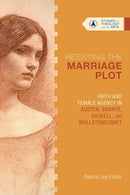Description
Distributor: 316Europe
"I cannot suppose any situation more distressing than for a woman of sensibility with an improving mind to be bound to such a man as I have described." Mary Wollstonecraft's response to one of her early critics points to the fact that fiction has long been employed by authors to cast a vision for social change. Less acknowledged, however, has been the role of the Christian faith in such works. In this latest volume in IVP Academic's Studies in Theology and the Arts series, literary scholar Dalene Joy Fisher explores the work of four beloved female novelists: Jane Austen, Anne Brontë, Elizabeth Gaskell, and Mary Wollstonecraft. Each of these authors, she argues, appealed to the Christian faith through their heroines to challenge cultural expectations regarding women, especially in terms of marriage. Although Christianity has all too often been used to oppress women, Fisher demonstrates that in the hands of these novelists and through the actions of their characters, it could also be a transformative force to liberate women.
Fiction has long been used to cast vision for social change, but the role of Christian faith in such works has often been overlooked. In this STA volume, Dalene Joy Fisher examines how the works of Jane Austen, Anne Brontë, Elizabeth Gaskell, and Mary Wollstonecraft challenge cultural expectations of women and marriage, exploring how Christianity can be a transformative force of liberation.
"I cannot suppose any situation more distressing than for a woman of sensibility with an improving mind to be bound to such a man as I have described." Mary Wollstonecraft's response to one of her early critics points to the fact that fiction has long been employed by authors to cast a vision for social change. Less acknowledged, however, has been the role of the Christian faith in such works. In this latest volume in IVP Academic's Studies in Theology and the Arts series, literary scholar Dalene Joy Fisher explores the work of four beloved female novelists: Jane Austen, Anne Brontë, Elizabeth Gaskell, and Mary Wollstonecraft. Each of these authors, she argues, appealed to the Christian faith through their heroines to challenge cultural expectations regarding women, especially in terms of marriage. Although Christianity has all too often been used to oppress women, Fisher demonstrates that in the hands of these novelists and through the actions of their characters, it could also be a transformative force to liberate women.
Fiction has long been used to cast vision for social change, but the role of Christian faith in such works has often been overlooked. In this STA volume, Dalene Joy Fisher examines how the works of Jane Austen, Anne Brontë, Elizabeth Gaskell, and Mary Wollstonecraft challenge cultural expectations of women and marriage, exploring how Christianity can be a transformative force of liberation.
Paiement et sécurité
Vos informations de paiement sont traitées de manière sécurisée. Nous ne stockons pas les détails de votre carte de crédit et n'avons pas accès à vos informations de carte de crédit.


